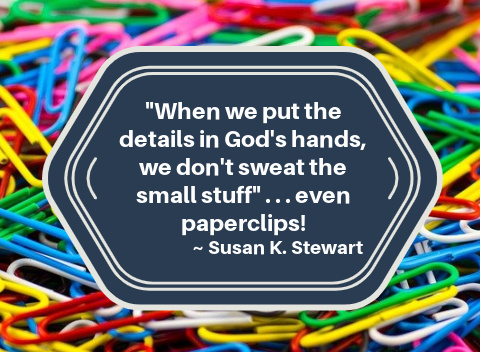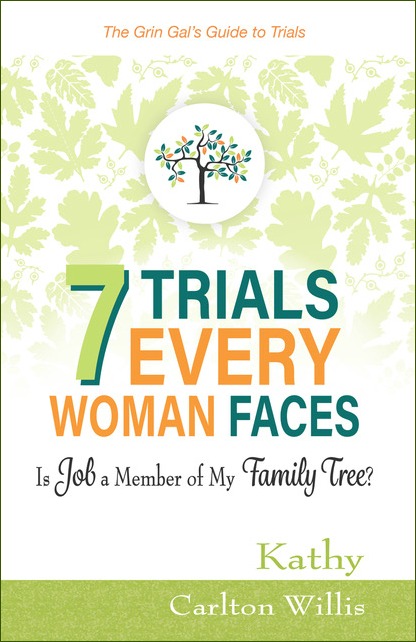Courage for Resisting the 'Fear of Man'
Kathy Collard Miller's focus on the believer's identity in Christ has helped her navigate many issues in life, and she encourages others in that journey as well. In this Biblical Thinking UPGRADE, she encourages trust in God's love and concern for us rather than getting caught up in what others think—the "fear of man." "I suffer from the 'fear of man,' Kathy says. "Proverbs 29:25 says, 'The fear of man lays a snare, but whoever trusts in the Lord is safe' (ESV)."
"I suffer from the 'fear of man,' Kathy says. "Proverbs 29:25 says, 'The fear of man lays a snare, but whoever trusts in the Lord is safe' (ESV)."
I (Dawn) am sure every one of us has been caught in that snare at some time in life, and some people have a greater tendency to get caught. It takes courage and intentionality to fight against the destructive fear of man.
Kathy continues . . .
I was recently surprised to find some powerful wisdom in Isaiah 51:12-13 (ESV) for fighting the fear of man.
Those verses say:
I, I am he who comforts you;
who are you that you are afraid of man who dies,
of the son of man who is made like grass,
and have forgotten the Lord, your Maker,
who stretched out the heavens
and laid the foundations of the earth,
and you fear continually all the day
because of the wrath of the oppressor,
when he sets himself to destroy?
And where is the wrath of the oppressor?
The fear of man—who may feel like an “oppressor”—comes from thinking other people are the best source of what we need.
In verse 12, God says He offers comfort to us. The Hebrew word “comfort” has the idea of expressing sympathy.
Quite often when we fear the opinions of "man," we are looking for understanding, approval, and affirmation from others.
When people seem to come through for us, we feel “comforted” in knowing we are a person of value.
How can we resist that snare and trust God instead based on Isaiah 51:12-13?
Truths to Consider
1. The comfort from other people is temporary, but God’s is eternal.
Someone may offer us what we want, but the next time she may fail us. Only God’s opinion of us never changes.
2. Only God is wise enough to truly know what we need.
If God wisely and powerfully created us, He knows our real, valid needs. He provided the demonstration of Jesus dying on the cross for our sins when we don’t deserve it. No one else can do that for us.
Ephesians 1:3-14 offers the fullest, most concise identifiers of believers in the Bible. God says because of our inheritance through Christ, we are identified as blameless, forgiven, blessed, holy, redeemed, loved, chosen, predestined, conformed, secure and other declarations of who we are in His view of us.
3. Recognize how the fear of man creates stress.
Living in God’s love brings love, joy, peace, and other fruits of the Spirit (Galatians 5:22-23).
4. What we fear usually isn’t as bad as we anticipate.
In effect, God says through Isaiah, “Is it really as bad as you anticipated?” Sometimes it does feel as horrible, but when we see how God wants to affirm our worth and value, we can also see how we grow from the challenge.
Early in my marriage to Larry, I was afraid of his displeasure. I carefully tried to evaluate his every reaction and then change my behavior based on what I assumed he was “telling me.”
In time, I read about the “fear of man” and was convicted of putting Larry’s opinion of me higher than God’s.
One day, Larry seemed irritated. I boldly asked, “Larry, you look angry. Are you mad at me?”
He looked surprised and replied, “Do I? No, I’m not mad at you. I was thinking about work.”
From that day on, I learned to ask instead of assume.
Here are some practical suggestions for diminishing the fear of man.
- Memorize and meditate on Isaiah 51:12-13.
- Ask yourself exactly what it is you fear.
- Make a list of your inheritance in Christ as Ephesians 1:3-14 defines you. Put it in several prominent places in your home and work space.
- Forgive others who respond to you out of their own hurt and pain. Their reaction says nothing about how valuable you are and how loved you are by God.
How can you more effectively allow God to comfort you instead of a person’s opinion of you?
 Kathy Collard Miller has long depended on her identity in Christ to grow in resisting the snare of the fear of man. God has used His journey for her through His opportunities to write over 60 books, speak in 9 countries and
Kathy Collard Miller has long depended on her identity in Christ to grow in resisting the snare of the fear of man. God has used His journey for her through His opportunities to write over 60 books, speak in 9 countries and over 30 US states. One of her newer books is Pure Hearted: The Blessings of Living Out God’s Glory where she expands on knowing our identity in Christ. Kathy and her husband, Larry, of 52 years, are parents, grandparents, lay counselors, and live in Boise, Idaho. Visit her at KathyCollardMiller.com.
over 30 US states. One of her newer books is Pure Hearted: The Blessings of Living Out God’s Glory where she expands on knowing our identity in Christ. Kathy and her husband, Larry, of 52 years, are parents, grandparents, lay counselors, and live in Boise, Idaho. Visit her at KathyCollardMiller.com.
Graphic adapted, courtesy of Pexels at Pixabay.
 2 Comments → Posted on
2 Comments → Posted on  Thursday, January 5, 2023 at 11:00AM
Thursday, January 5, 2023 at 11:00AM  Courage,
Courage,  Fear of Man,
Fear of Man,  God of Comfort,
God of Comfort,  God's comforting,
God's comforting,  Identity in Christ,
Identity in Christ,  Isaiah 51:12-13,
Isaiah 51:12-13,  Kathy Collard Miller,
Kathy Collard Miller,  Trust God,
Trust God,  Upgrade with Dawn Upgrade Your Life
Upgrade with Dawn Upgrade Your Life  Biblical Thinking,
Biblical Thinking,  Trusting God
Trusting God 
















